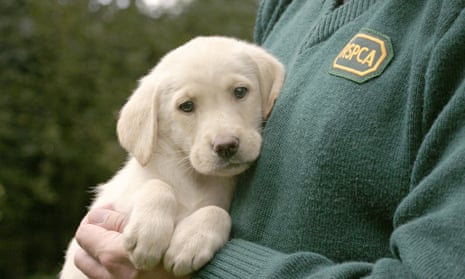Politicians, journalists and estate agents are the reliable villains in the panto of public life. These days, though, they might welcome a surprising addition to their beleaguered ranks: the charity fundraiser. For a while now, and especially since the tragic death of poppy seller Olive Cooke after a barrage of cold calls was said to have driven her to suicide, chuggers and their colleagues have been firmly in the crosshairs of the nation’s investigative reporters. They are surely the most counterintuitive monsters of our age. We used to hate Big Tobacco, Big Oil, Big Pharma; now it’s Big Charity.
Big Charity got another monstering today, when it was reported that the RSPCA pays investigators to assess how much donors could potentially leave in their wills, a process denounced as “snooping”. Far less laudable organisations routinely use similarly invasive methods to target potential customers, but that doesn’t seem to be relevant.
No matter, either, that such an approach could narrow fundraising approaches in a way that will surely make the process more efficient and less costly, allowing more to be spent on the good causes themselves, and reducing the number of future Olive Cookes. When the story starts from a presumption of wickedness that is now unremarkable, all of this is beside the point. And, weirdest of all, hardly anyone in the charitable sector seems able to mount a robust defence.
As charitable giving declines, we are building a culture in which charities will be lauded not for the good work they do, but for the politeness of their consent to their own demise. None of this is to suggest that the myriad stories to have appeared in recent months haven’t raised profound issues for charities to consider. Some of the practices have been flatly irresponsible, and ends cannot justify means. Betrayal is more devastating when it comes from someone you trust.
All the same, there is a blindingly obvious fact that has to come to the centre of this debate, and which is currently milling around on the fringes, clearing its throat, tentatively putting its hand up and apologetically giving way to the guy with the loudhailer. It’s this: charities do not exist to maximise profit for shareholders at all costs. They exist to serve the people and causes that desperately need them, and nothing else. No, ends can’t justify means. But surely we can agree that they can mitigate them.
So, here’s an impolite suggestion to Big Charity, currently in agonies over how best to deal with this crisis. Stop letting it seem as if you are apologising for your existence. Expand your engagement with critical press beyond a cringing apology and a promise to review your procedures. Start making a forceful attempt to remind us of why charities matter.
In the US, an organisation called the Charity Defense Council has taken this on with a series of ads that make the positive case for why charities have to raise money. The nearest British equivalent, an initiative of philanthropic PR network CharityComms called Understanding Charities, is yet to launch. It had better get on with it. With every fresh news story, our shared faith in charities as the expression of what’s best about us is eroded. That might be a welcome distraction for journalists and politicians, but it’s terrible for the people who rely on what they do.

